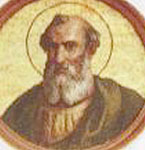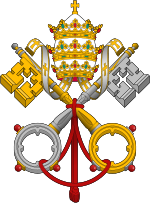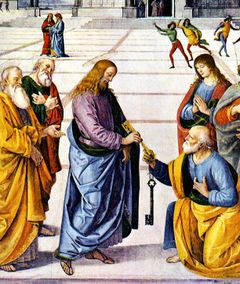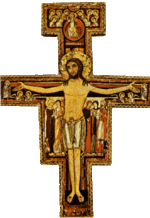Pope Victor I
| Saint Victor I | |
|---|---|
 |
|
| Papacy began | 189 |
| Papacy ended | 199 |
| Predecessor | Eleuterus |
| Successor | Zephyrinus |
| Personal details | |
| Birth name | Victor |
| Born | ??? Roman Africa |
| Died | 199 Rome, Roman Empire |
| Other Popes named Victor | |
| Papal styles of Pope Victor I |
|
|---|---|
 |
|
| Reference style | His Holiness |
| Spoken style | Your Holiness |
| Religious style | Holy Father |
| Posthumous style | Saint |
Pope Saint Victor I was Pope from 189 to 199 (the Vatican cites 186 or 189 to 197 or 201).[1]
Pope Victor I was the first bishop of Rome born in the Roman Province of Africa. He was later canonized. His feast day is celebrated on July 28 as "St Victor I, Pope and Martyr".[2]
Before his elevation to the Roman episcopacy, a difference in dating the celebration of the Christian Passover/Easter between Rome and the bishops of Asia Minor had been tolerated by both the Roman and Eastern churches. The churches in Asia Minor celebrated it on the 14th of the Jewish month of Nisan, the day before Jewish Passover, regardless of what day of the week it fell on, as the Crucifixion had occurred on the Friday before Passover. The Latins called them Quartodecimans. Rome and the West celebrated Easter on the Sunday following the 14th of Nisan. Victor is remembered for the great concern he displayed for order in the church by severing ties with bishops such as Polycrates of Ephesus who opposed his views on Easter.[3] He also broke with Theodotus of Byzantium for his beliefs about Christ.[4]
Until Victor's time, Rome celebrated the Mass in Greek. Pope Victor changed the language to Latin, which was used in his native North Africa. According to Jerome, he was the first Christian author to write about theology in Latin. Latin masses, however, did not become universal until the latter half of the fourth century.[5]
References
- ↑ He was the first Pope from Africa. The dates assigned to Victor’s episcopate by the ancient authorities vary greatly. Eusebius here puts his accession in the tenth year of Commodus (i.e. 189 a.d.), and this is accepted by Lipsius as the correct date. Jerome’s version of the Chron. puts his accession in the reign of Pertinax, or the first year of Septimius Severus (i.e. 193), while the Armenian version puts it in the seventh year of Commodus (186). Eusebius, in his History, does not state directly the duration of his episcopate, but in chap. 28 he says that Zephyrinus succeeded him about the ninth year of Severus, i.e. according to his erroneous reckoning (see Bk. VI. chap. 21, note 3) about 200, which would give Victor an episcopate of about eleven years. Jerome, in his version of the Chronicon and in his De Viris Illustribus, assigns him ten years; the Armenian version of the Chron. twelve years. The Iberian Catalogue makes his episcopate something over nine years long; the Felician Catalogue something over ten. Lipsius, considering Victor in connection with his successors, concludes that he held office between nine and ten years, and therefore gives as his dates 189–198 or 199 (see p. 172 sq.). According to an anonymous writer quoted in chap. 28, Victor excommunicated Theodotus of Byzantium for teaching that Christ was a mere man. He is best known, however, on account of his action in connection with the great Quartodeciman controversy (see chap. 24). Jerome, in his version of the Chron., says of him cujus mediocria de religione extant volumina, and in his de vir. ill. chap. 34, he tells us that he wrote upon the passover, and also some other works (super quaestione Paschae, et alia quaedam scribens opuscula). Harnack believes that he has discovered one of these works (all of which have been supposed lost) in the Pseudo-Cyprianic de Aleatoribus. In his Texte und Unters. Bd. V. Heft 1, he has discussed the subject in a very learned and ingenious manner. The theory has much to commend it, but there are difficulties in its way which have not yet been removed; and I am inclined to think it a product of the first half of the third century, rather than of the last quarter of the second (see the writer’s review of Harnack’s discussion in the Presbyterian Review, Jan., 1889, p. 143 sqq.). Schaff, Philip: The Nicene and Post-Nicene Fathers Second Series Vol. I. Oak Harbor : Logos Research Systems, 1997, S. 3
- ↑ See the General Roman Calendar of 1954
- ↑ Eusebius Pamphilius: Church History, Life of Constantine, Oration in Praise of Constantine, Ch. XXIV
- ↑ Eusebius Pamphilius: Church History, Life of Constantine, Oration in Praise of Constantine, Ch. XXVIII
- ↑ Kung, Hans. The Catholic Church: A Short History. New York; The Modern Library, 2003, p.44
External links
| Catholic Church titles | ||
|---|---|---|
| Preceded by Eleuterus |
Bishop of Rome Pope 189–199 |
Succeeded by Zephyrinus |
|
|||||||||||||||||||||||||||||||||||||||||||||
|
|||||||||||||||||||||||||||||||||||||||||

